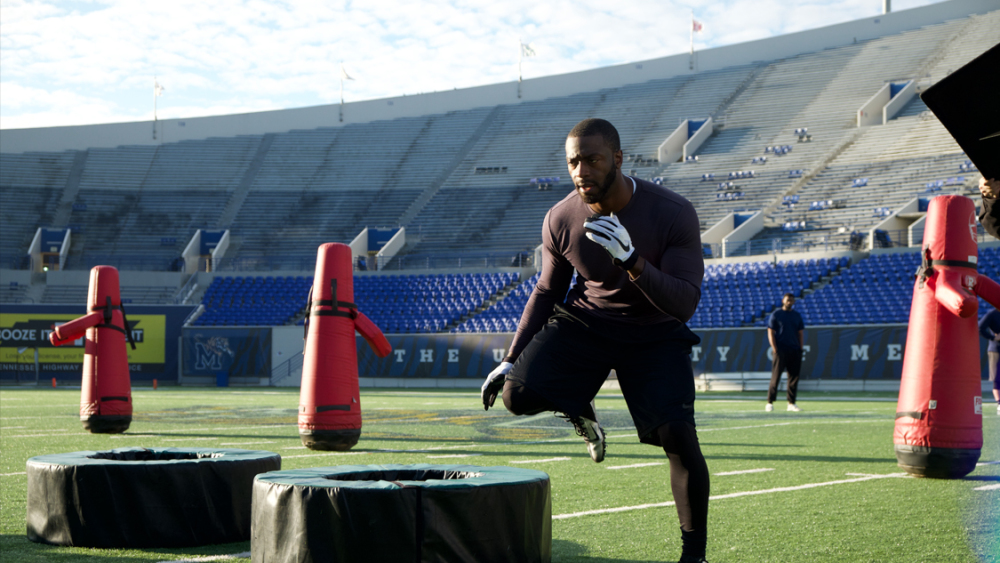BRIAN BANKS
Bleecker Street
Reviewed for Shockya.com & BigAppleReviews.net linked from Rotten Tomatoes by: Harvey Karten
Director: Tom Shadyac
Screenwriter: Doug Atchison
Cast: Aldis Hodge, Greg Kinnear, Sherri Shepherd, Xosha Roquemore, Melanie Liburd, Tiffany Dupont
Screened at: Tribeca, NYC, 6/5/19
Opens: August 9, 2019
When Spain in the 15th century determined to make the entire country Catholic, Jews and Muslims were told that if they did not convert to Catholicism, they would be expelled from the country. Most did. The authorities set up the Spanish Inquisition. If a converso, i.e. a Jew who converted to Catholicism, could be caught secretly practicing Judaism, e.g. by lighting candles on Friday night, he or she could be hauled before the court of the Inquisition and, if found guilty, could be tortured and executed. Some say that it was enough for a servant to accuse her boss of heresy, of practicing Judaic rituals though professing identity as a new Catholic. The servant’s word would be taken. A similar event in a way, made into art by the 1960 novel by Harper Lee “To Kill a Mockingbird,” deals with a false accusation of rape made by a Mayella Ewell, a white woman against Tom Robinson, a black man.
It took some guts to produce the movie “Brian Banks” at a time that the #MeToo movement carries momentum as women have stepped forward in greater numbers than ever before accusing men of sexual harassment and more. Men who have questioned the veracity of accusers are ostracized as Neanderthals who want to bring back the 1950s, when women, having pledged to honor, cherish and obey their future husbands, stayed in the kitchen and sucked up (so to speak) any harassment of a sexual nature. “Brian Banks” is the anti-#MeToo movie, though since it’s based on true facts, the cast and crew cannot legitimately be faulted for standing up for a man who had been falsely accused of rape.
The title character is played by Aldis Hodge in a career-making role. Hodge, one of the most muscular guys you’ll see in the movies, delivers a stunning performance in a powerful movie closely based on true events that took place beginning in 2002. Though his director Tom Shadyac is known largely for comedies like “Bruce Almighty” and “The Nutty Professor,” Shadyac does quite an impressive job hammering home the injustices of our legal system, here specifically against what is called California’s “broken system.” (If a blue state’s system is broken, what must be going on in Alabama?)
Brian Banks had everything going for him. A football player at Long Beach, California high school offered a scholarship at USC which may have seen him as destined for the NFL, he briefly flirts with a female high school student, Kennish Rice (Xosha Roquemore) in the hall. They go past other classrooms into a secluded area known as a make-out spot, kiss, and are spotted by a security guard. Returning to class, Kennisha—who later admits that she was afraid to tell her mother that she was sexually active—accuses Banks of rape. Banks’s lawyer, who must have been as stupid as Kennisha, never insisted on DNA evidence, tells her client that he should plead guilty and take probation rather than risk a 41-year-sentence, but looks as shocked as Banks when the judge denies probation and hands down a six-year sentence with years of parole following. His football career appears over, Banks cannot get a job, and he is harassed repeated by his parole officer when Banks temporarily leaves the county to interview for jobs.
Banks contacts Justin Brooks (Greg Kinnear), founder and head of the California Innocence Project, who at first sees the man as another of the hundreds, more likely thousands of petitioners asking for help in getting their sentences overturned. Behind the scenes, Kennisha’s mother (Monique Grant) sues the school for providing lax security, winning a $1.5 million settlement. With that kind of money, we cannot expect Kennisha to ‘fess up and admit that she lied, thereby losing the award and freeing Banks to get his life back.
Many scenes should enrage an audience of fair-minded people who still think that America is the land of the free and the home of the brave. Watch how the technicalities of the law prevent common sense judgments. Best example: during the end of his parole period Banks gets Kennesha to admit her lies, the confession is taped, but the tape cannot be admitted in court since Kennesha did not give permission to be recorded. Banks is provoked into a fight in prison, breaks the guy’s jaw, and is sentenced to 60 days in the hole, in solitary, a tiny room that could be used on the set of a movie taking place on Devil’s Island. If Americans who regularly cite the Second Amendment would protest violations of the Eighth Amendment as forcefully, maybe we would get somewhere to creating a more just society.
Greg Kinnear delivers mightily as a man who has noble ideals but can disappoint since he must choose his cases among thousands of requests, while Sherri Shepherd plays the kind of mom we all want who will stick up for her boy, wanting his happiness more than anything else. Contrast her role with that of Kennisha’s mom who, in sticking up for her lying daughter enacts a scene that smacks of racist stereotypes.
Yes, the movie can be schmaltzy, but the schmaltz is what brings tears to the eyes and joy in the ultimate outcome. This is a movie that’s easy to recommend for large public consumption, a “To Kill a Mockingbird” for the 21st Century.
For the actual facts of the case go to https://www.law.umich.edu/special/exoneration/Pages/casedetail.aspx?caseid=3901
99 minutes. © 2019 by Harvey Karten, Member, New York Film Critics Online
Story – A-
Acting – A
Technical – b+
Overall – A-

